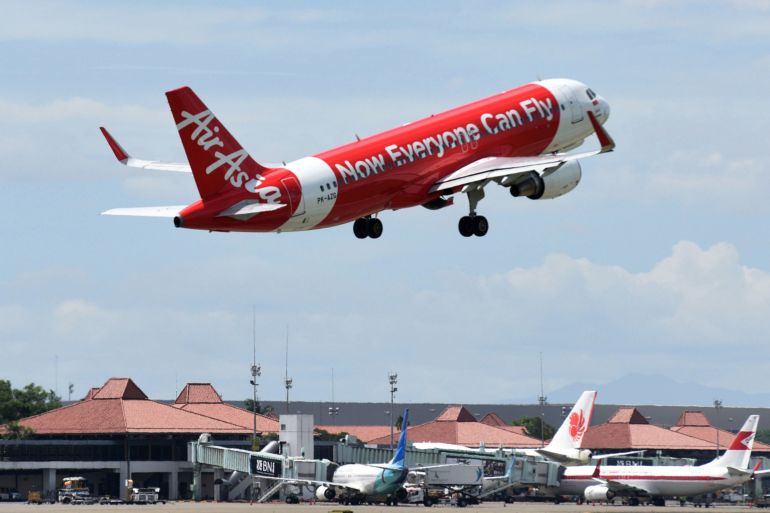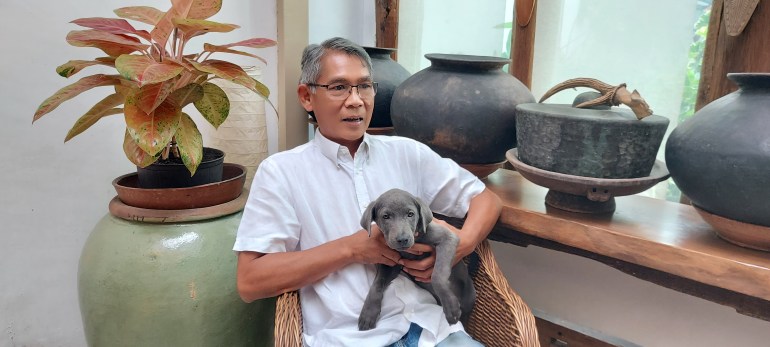Indonesia’s $6bn airport bid to rival Singapore raises eyebrows
Plan to turn North Sumatra airport into hub servicing 50 million passengers prompts transparency, feasibility concerns.

Medan, Indonesia – A $6bn proposal to turn an Indonesia airport into a regional hub rivalling Singapore and Kuala Lumpur has sparked concern among local tour operators who question the transparency and feasibility of the project.
Indonesia’s state-owned airport operator and an Indian-led consortium propose transforming Kualanamu International Airport in North Sumatra province into one of the region’s busiest airports with 50 million passengers every year.
Keep reading
list of 4 itemsAsia holds tight on borders, casting cloud over COVID-hit travel
Flush with vaccines, Asia sees return to normal slip out of reach
Take-off delayed: COVID snuffs out fragile Asia aviation recovery
Under the plan announced earlier this month by Angkasa Pura II and GMR Airports Consortium, the airport would see passenger numbers rise five-fold compared with pre-pandemic levels to rival Kuala Lumpur International Airport and Changi.
GMR Airports Consortium, which is made up of Indian-owned GMR Group and French Aeroports de Paris group, has pledged an initial investment of IDR 56 trillion investment ($3.9bn) as part of a 25-year contract to develop the airport, with the remainder to come from the Indonesian side.
The sudden announcement of the deal, however, has sparked controversy within the tourism industry in North Sumatra, with some stakeholders asking why they were not consulted and expressing concern the airport had been “sold to India”.
“I think it is OK to hand it over to foreign management but it needs to be clear what is happening,” Mercy Panggabean, the general manager of Medan-based tour company PT Wesly Tour & Travel, told Al Jazeera. “Why were tour operators not invited to discuss this when they had the tender? There was no news about any of this until we found out through the media that GMR Airports Consortium had won.”
Panggabean said that while local operators were not opposed to the deal itself, state-owned Angkasa Pura II needed to be more transparent about the details of the project.
“Does this mean that there will be direct flights to Kualanamu? What is the target here?” she said.

Clement Gultom, managing director of Boraspati Tour and Travel in Medan, told Al Jazeera he was also surprised by the announcement, although he had “not seen any Indonesian company with the same portfolio” as GMR Airports Consortium when it came to airport development.
GMR Group operates Delhi Indira Gandhi International Airport and Hyderabad International Airport in India and has contracts to develop airports in Greece and the Philippines. Aeroports de Paris owns and operates Paris-Charles de Gaulle, Paris-Orly and Paris-Le Bourget in France.
Despite the concerns within the local tourism industry, Djamanat Samosir, an expert in Indonesian investment law, told Al Jazeera there was little about the deal that appeared to be cause for alarm.
“The fact that they went through a tender process shows that this was fair and transparent,” Samosir said. “They will have drafted a clear contract between the different parties setting out expectations and there is nothing strange about any of that. If they don’t stick to the contract or there is a subsequent dispute about what was agreed, then we can say that there was something odd about this deal.”
However, Samosir said it was impossible to know the specific details of the project without being able to see the actual contract.
“That is the most important thing that we need to find out,” he said.
Angkasa Pura II and GMR Airports Consortium did not respond to Al Jazeera’s requests for comment.
Earlier this month, Kartika Wirjoatmodjo, the deputy minister for state-owned enterprise, told parliament Kualanamu International Airport would be “scaled up to be a world-class airport” due to its “very strategic position”.
Srinivas Bommidala, GMR Group chairman for energy and international airports, has said the company envisages “transforming the airport into an international hub”.
‘Bad investment’
The airport currently functions as a provincial hub for passengers travelling to other parts of Sumatra such as Aceh or Batam. Before the COVID-19 pandemic, the airport had limited flights to Singapore and Malaysia.
Gultom, managing director of Boraspati Tour and Travel, questioned the timing of the development given the collapse of international travel during the pandemic.
“There is not just a problem with entry to a country but coming back to your country of origin is now also difficult,” he said. “There are so many barriers stopping you. Travel will never get back to where it was.”
He said the target of 50 million passengers did not seem realistic, questioning why GMR Airports Consortium would have agreed to the deal.
“Is it going to be profitable for them? That is what is fishy to me,” he said, speculating the consortium would struggle to recoup its investment.
“In my opinion, it is a bad investment,” he added. “How can they make money?”